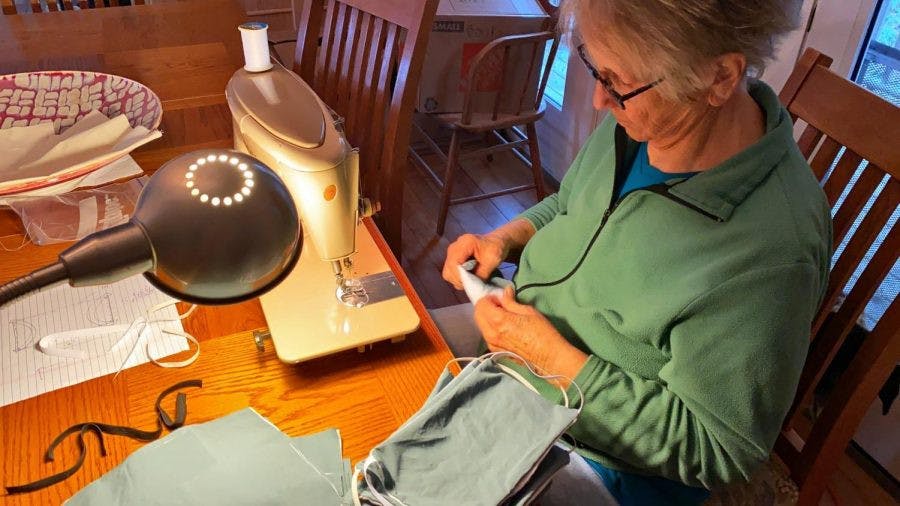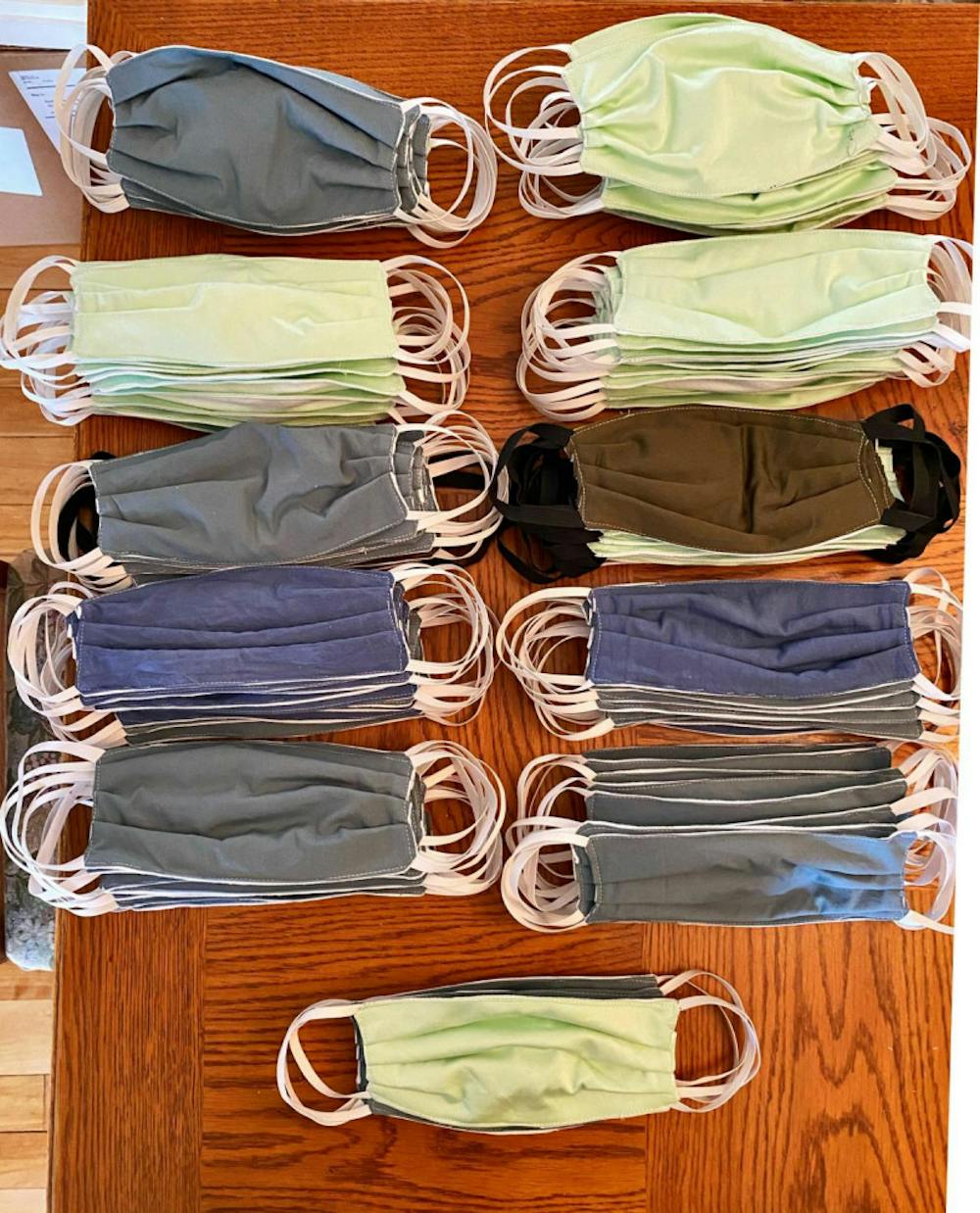The Middlebury College Theatre Department Costume Shop is accustomed to last minute alterations, so when the Covid-19 pandemic hit Vermont, employees quickly changed course from sewing costumes to sewing face masks.
Led by Associate Costume Director Robin Foster Cole and Costume Shop Director Carol Wood, the seamsters immediately set to work organizing materials and mask patterns the moment the college shut down in March. “We call it the Massive Midd Mask Making Movement,” Wood said.
“It’s all about the silver linings to the pandemic,” Foster Cole added. “We weren’t going to sit idly. This is bigger than a show.”
Foster Cole’s best friend from high school is an emergency room doctor in Rhode Island. After speaking with her on the phone, Foster Cole realized she had the opportunity to play a role in the fight against the virus too.
According to the Centers for Disease Control and Prevention, cloth masks are not interchangeable with medical grade masks, but can help reserve medical masks for health service professionals and others who critically need them.
Shortly after most students evacuated campus, Mark Peluso, Middlebury’s director of health services, contacted Alex Draper, chair of the Theatre Department. Peluso requested the department’s costume shop sew face masks for healthcare workers at Porter Hospital, where there was a limited supply of standard masks; by that time, Wood and Foster Cole were already on it.
Not long after that, the college made another mask request: this time, could the students and staff remaining on campus also be supplied two masks each? “There was no doubt we could execute this,” Wood said.
After seeing a Facebook post online of the costume shop’s progress, members from the college’s laundry services offered their sewing skills and joined in on the mask-making mission.
For Foster Cole, this communal effort by all ends of the Middlebury community was not left unnoticed. “I grew up in Middlebury,” she said. “It’s amazing how many people here stepped up to take care of each other.”
The masks are made with cotton fabric, a layer of fleece for extra comfort and protection, and elastic bands to wrap securely around ears. But even with the stockpile of supplies in the costume shop, Wood and Foster Cole needed more materials to continue manufacturing masks.
President Laurie Patton stepped in, generously offering to financially support this endeavor with personal discretionary funds for more fabric and elastic.
“I love that this simple skill of sewing we love to do is helping the community,” Foster Cole said. “We’re doing it for the college, but also for the greater community.”
Wood explained sewing the masks is not difficult, especially with her 11 years experience as a draper and stitcher with the San Francisco Opera, and the aid of her mother, Nancy Wood. This professional experience allows her to cut about 100 pieces of fabric for masks every hour, plus the additional three-and-a-half minutes of sewing it takes Wood and her mother to make one mask. After the measuring, cutting and sewing takes place, the masks are washed twice, pleats pressed, size marked, and packaged up for distribution: 300 masks to add to the college’s augmenting stockpile, the rest to Round Robin, the local nonprofit overseeing mask collection and delivery to Porter Hospital and other local organizations.
According to Wood, the costume shop churns out 400–600 masks per week. To date, the mask makers have produced 3,000 masks and counting.

Wood and Foster Cole, along with their tenacious team of sewers, do not have a numerical goal for the number of masks they are manufacturing. “We’re going to do whatever is needed,” Wood said. “Whatever it takes, however many we make, no one is going to go without a mask.”
Mai Thuong ’22 is one of the students who remained on campus. She was given a homemade mask a few weeks ago and wears it on a regular basis.
“We use them when we go to the dining hall to make both the dining staff and the students less paranoid of transmitting something to each other,” Thuong said. “Psychologically, it just also appears safer.”
“The fashionable nature of the mask is also a big plus,” Thuong added. “When I got my masks with bright sunflowers on them, it made me really happy.”
After hearing of the costume shop’s production-efficient assembly line, senior Abbey Knight ’19.75 also joined in, offering their sewing skills to whip up additional masks while isolating off-campus in Middlebury. “I love hands-on projects, so making masks felt like a fun craft project with a purpose,” Knight said.
Knight is new to sewing, having learned how to this year for a puppet show. “Making masks has been a good way to learn more about the ever-mysterious sewing machine and practice the basics.”
Volunteer residents of the greater Addison County have also joined in the nationwide effort to provide health care workers and neighbors in the community with protective face masks. Faith Daya of Brandon, a retired community organizer and mentor at the sewing lab at the Makery – the collaborative maker space at the Hannaford Career Center in Middlebury – is one of those volunteers.
A month ago, Daya pulled together an email list of “just a few people, maybe 45 women,” sending out the call for help in making masks. “It’s truly a labor of love,” she said. “This is like having a mission, a purpose to help others.”
To date, Daya’s group, dubbed “Sew Vermont Safe,” has made and donated more than 2,500 face masks to area businesses, clinics, assisted living residencies, subsidized housing works, and hospice care employees across the Addison and Rutland counties.
For those interested in joining the cause and obtaining mask sewing kits, contact Carol Wood at cbwood@middlebury.edu, Faith Daya at faithdaya55@gmail.com, or visit https://unitedwayaddisoncounty.org.




